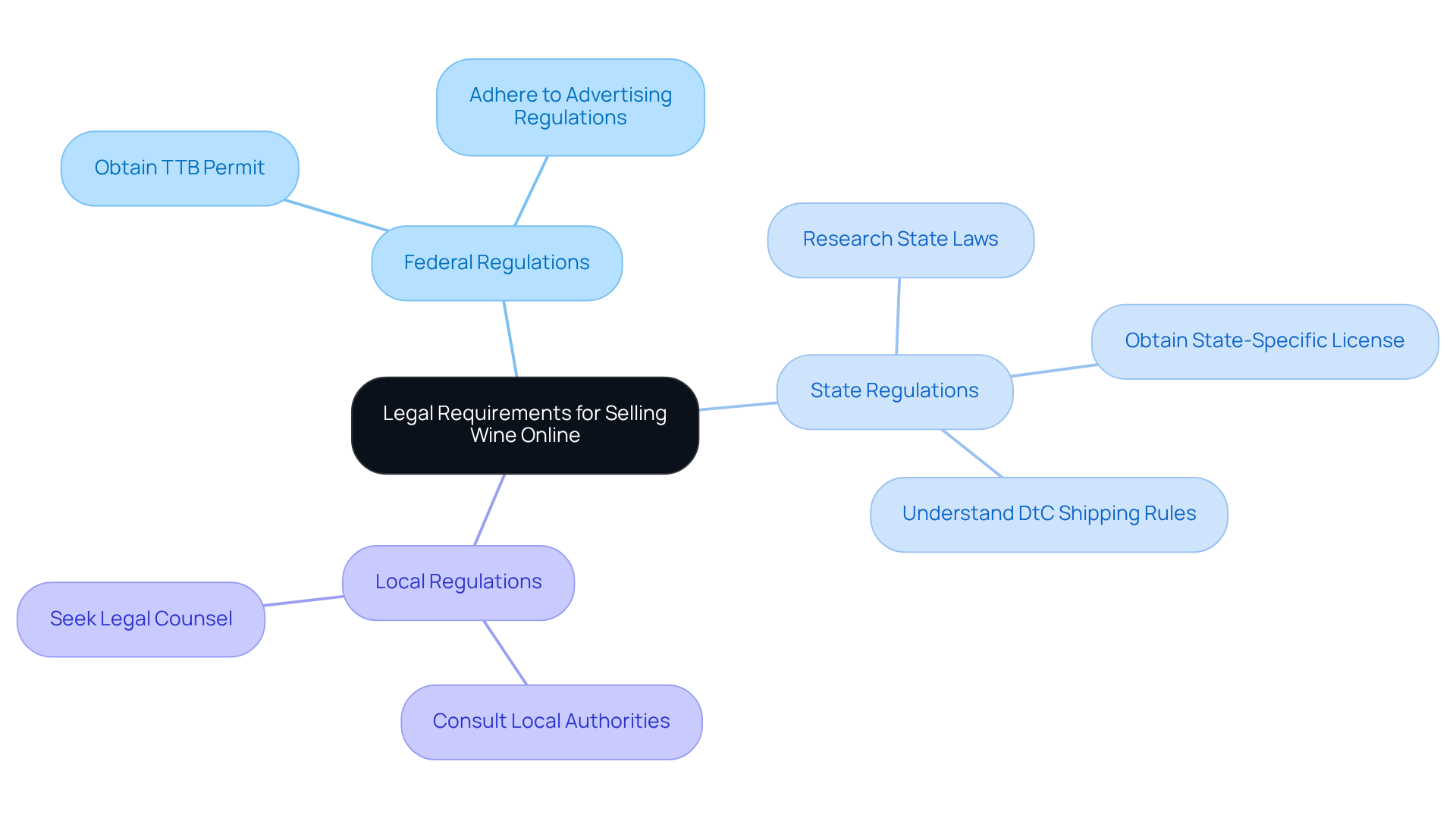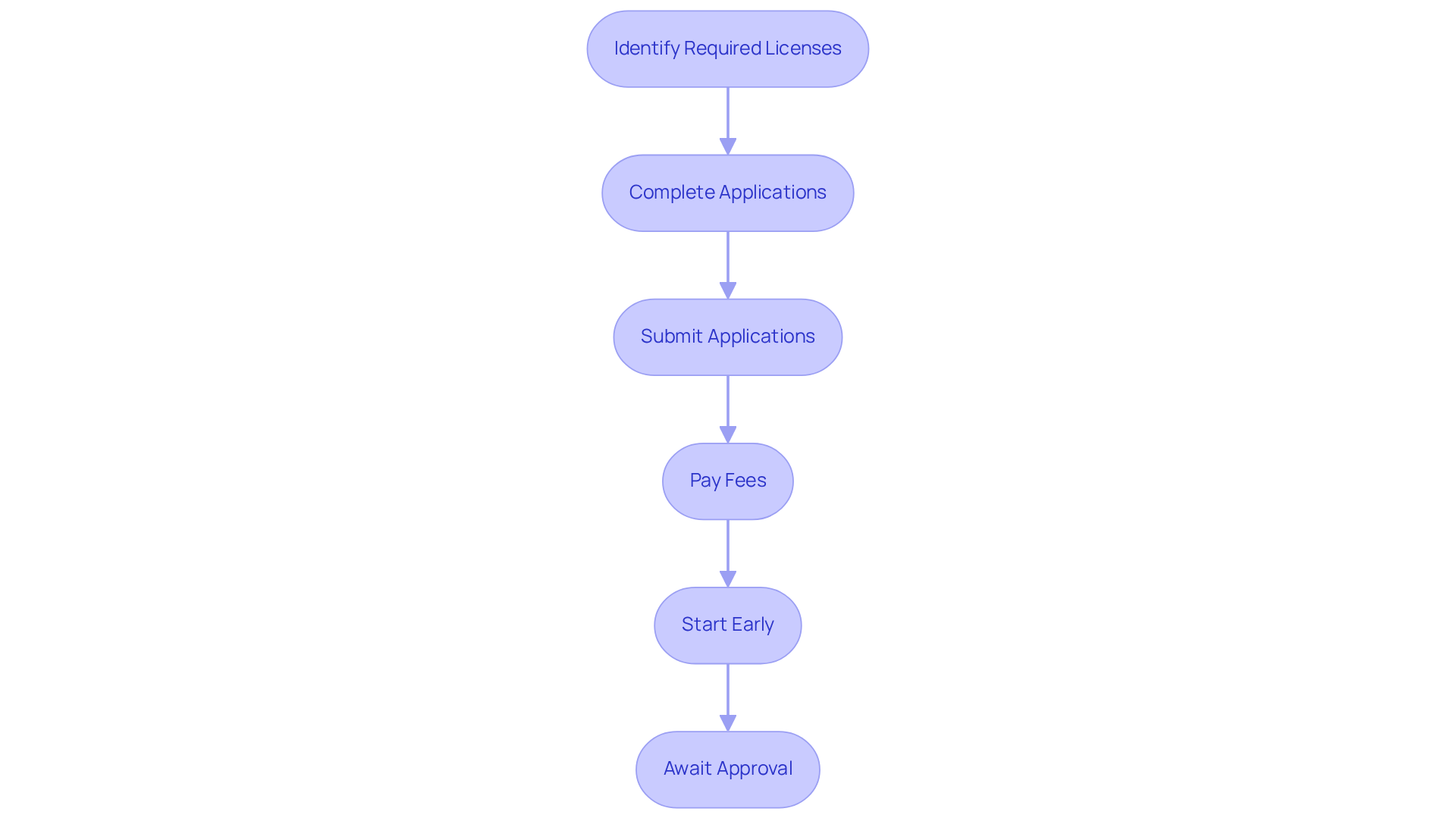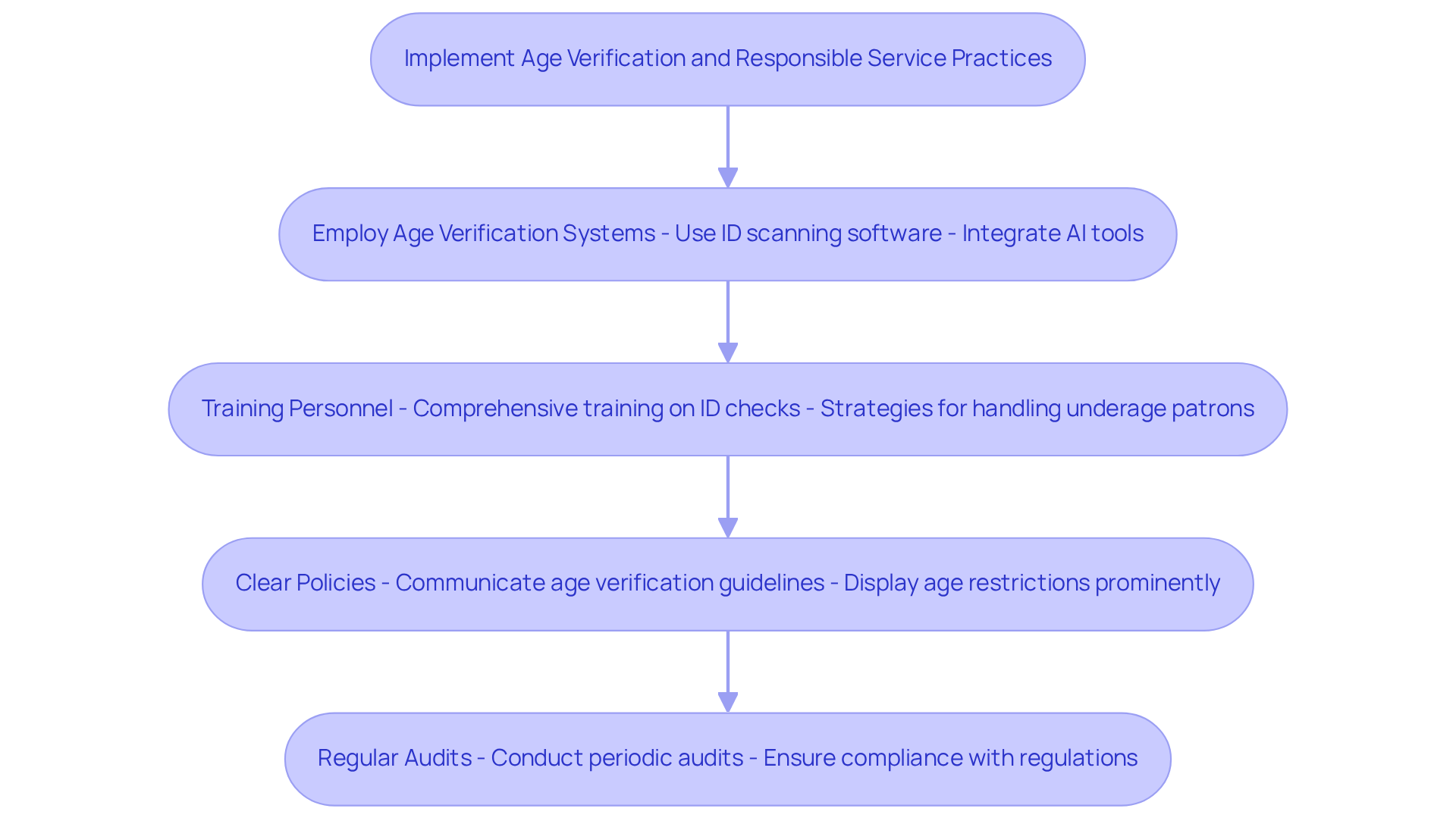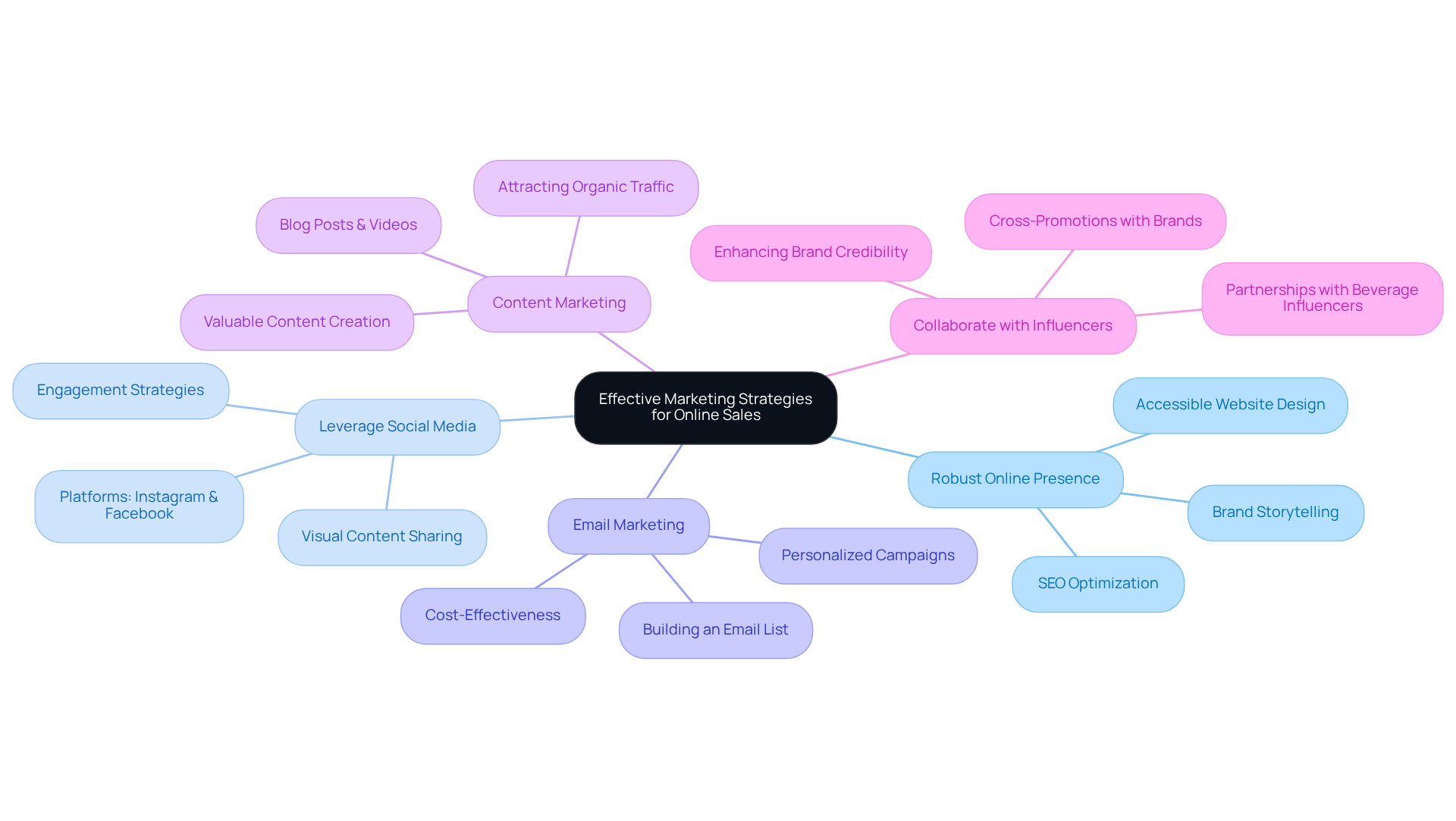Overview
To successfully obtain a license to sell wine online, it is crucial to grasp the legal requirements, which encompass federal, state, and local regulations. Completing the necessary applications and permits is a fundamental step in this process. This article underscores the significance of compliance with these regulations, while also highlighting the necessity for effective age verification practices.
Furthermore, it emphasizes the importance of strategic marketing to ensure successful online wine sales. By adhering to these guidelines, stakeholders can navigate the complexities of the industry with confidence and authority.
Introduction
Navigating the world of online wine sales presents a complex endeavor, particularly in understanding the myriad legal requirements governing this industry. As demand for online wine shopping continues to rise, aspiring sellers must equip themselves with comprehensive knowledge of federal, state, and local regulations to effectively secure the necessary licenses.
The potential for significant penalties for non-compliance raises an important question: how can one ensure a smooth path to obtaining a license to sell wine online while also implementing responsible service practices?
This guide delves into essential steps and strategies designed not only to achieve compliance but also to thrive in the competitive online marketplace.
Understand Legal Requirements for Selling Wine Online
Before you embark on your online wine transactions, it is crucial to grasp the legal framework governing alcohol commerce, especially the requirement for a license to sell wine online. Understanding this landscape will equip you with the knowledge necessary to navigate enforced by the Alcohol and Tobacco Tax and Trade Bureau (TTB) and the specific regulations pertinent to your state. Consider the following essential factors:
- Federal Regulations: To engage in the production or sale of alcohol, a basic permit from the TTB is mandatory. Visit the TTB's website to access the requisite forms and comprehensive guidelines to ensure compliance. Additionally, promotions by social media influencers must adhere to the advertising regulations set forth by the TTB, underscoring the importance of informed marketing practices.
- State Regulations: Each state enforces unique laws regarding alcohol distribution, including specific licensing requirements, such as obtaining a license to sell wine online for online transactions. Conduct thorough research on your state's regulations to ascertain what is necessary for obtaining a license to sell wine online for legal compliance. Notably, 47 states and D.C. allow consumers to make and receive purchases of beverages from producers, significantly expanding market potential.
- Local Regulations: Beyond state laws, local governments may impose additional regulations. Consulting with local authorities is imperative to ensure that you fulfill all applicable requirements. Moreover, seeking counsel from a lawyer specializing in alcohol regulations can provide invaluable guidance in navigating the complexities of compliance.
By thoroughly understanding these legal frameworks, you can mitigate potential legal challenges and facilitate the smooth operation of your online beverage sales.

Obtain Necessary Licenses and Permits
To successfully market wine online, obtaining the necessary approvals and a license to sell wine online is paramount. Here’s how to navigate this process effectively:
-
Identify Required Licenses: Your business model dictates the licenses you'll need, which typically include:
- A federal basic permit from the Alcohol and Tobacco Tax and Trade Bureau (TTB).
- A state-issued permit for alcohol, varying based on whether you operate as a retailer, wholesaler, or manufacturer.
- A local business permit.
-
Complete Applications: Assemble the required documentation, which may consist of:
- Proof of identity and business registration.
- Financial statements or a comprehensive business plan.
- Background checks for owners and key personnel.
-
Submit Applications: Apply for your licenses through the proper channels:
- For federal permits, use the TTB's online application system.
- For state permits, consult your state's alcohol control board website to understand the specific application process.
-
Pay Fees: Anticipate application costs, which can vary considerably based on permit type, location, and business size. In 2025, expenses for federal and state alcohol permits can range from $1,500 to $5,000, influenced by several factors.
-
Start Early: To ensure your alcohol permit is secured by your grand opening, initiate the application process 4-6 months in advance. This timeline is crucial for avoiding delays in approval.
-
Await Approval: After submission, monitor your application status. The approval process can span several weeks to months, depending on jurisdiction and application complexity.
Understanding these steps is essential for ensuring compliance and to sell wine online in your beverage sales. Non-compliance with liquor regulations can result in severe penalties, including fines ranging from $500 to $50,000 or even license revocation. For further insights, consider consulting industry leaders or legal experts who can provide guidance on the necessary permits for wineries.

Implement Age Verification and Responsible Service Practices
To ensure compliance with age restrictions and promote responsible service in the wine industry, it is imperative to implement effective age verification practices.
Age Verification Systems: Employ advanced technology to confirm the ages of buyers during online transactions. Effective options include ID scanning software that validates identification documents by checking authenticity features such as watermarks and holograms. Additionally, age verification services that cross-reference customer data with public records enhance reliability. Consider integrating AI-powered tools that can detect questionable activity, such as repeated attempts to fake an account's age.
Training Personnel: Equip your team with comprehensive training on responsible service practices. This training should emphasize the critical importance of checking IDs to prevent underage sales and provide strategies for addressing situations involving underage patrons, ensuring staff are well-prepared to handle these scenarios appropriately.
Clear Policies: Establish and communicate transparent guidelines regarding age verification to your clients. This includes prominently displaying age restrictions on your website to inform visitors before they make a purchase and providing detailed information on acceptable forms of ID, ensuring customers understand what is required for verification. Transparency in the age verification process is essential for with consumers.
Regular Audits: Conduct periodic audits of your age verification processes to ensure compliance with evolving regulations and identify areas for improvement. This proactive approach not only mitigates legal risks but also fosters a culture of accountability within your organization. Remember, failure to comply with age verification laws can lead to significant legal consequences, including fines and the potential loss of your license to sell wine online.
By mastering these responsible service practices, wineries can significantly minimize the risk of underage transactions, which studies indicate can occur in up to 45% of attempts when inadequate measures are in place. Establishing strong age verification systems not only protects your business from legal repercussions but also fosters trust with consumers, reinforcing your commitment to responsible alcohol distribution. As Kerwell Liao, Product Marketing Manager at Persona, states, "A robust, multi-step age verification process can help licensees avoid legal consequences and protect their license to sell wine online by preventing inadvertent supply of alcohol to minors.

Develop Effective Marketing Strategies for Online Sales
With the legal and operational aspects established, it is crucial to focus on developing that will attract clients to your online beverage sales platform, particularly after obtaining a license to sell wine online. Consider the following tactics:
- Establish a Robust Online Presence: Develop an accessible website that not only showcases your products but also narrates your brand story. Ensure it is optimized for search engines (SEO) to enhance visibility. A well-optimized website can significantly expand your reach, as nearly 90% of global consumers utilize social media to stay informed about cultural trends, making a strong online presence essential.
- Leverage Social Media: Utilize platforms such as Instagram and Facebook to engage with potential clients. Share visually appealing content, including beverage pairings, vineyard tours, and client testimonials. By 2025, social media is projected to drive a substantial portion of wine transactions, with effective campaigns leading to increased consumer engagement and real-world actions.
- Email Marketing: Create an email list to keep clients updated on new releases, promotions, and events. Personalized emails can enhance customer loyalty and drive repeat sales. Email marketing remains one of the most cost-effective channels for generating direct-to-consumer revenue, with open rates in the leisure and hospitality sector averaging around 20.2%.
- Content Marketing: Develop valuable content related to beverages, such as blog posts, videos, and infographics. This strategy not only positions you as an expert in the beverage industry but also aids in attracting organic traffic to your website. Engaging content resonates with consumers, particularly when it aligns with their interests and preferences.
- Collaborate with Influencers: Partner with beverage influencers or bloggers to reach a broader audience. Their endorsements can enhance your brand's credibility and attract new clients. Collaborating with complementary brands can double your reach and improve visibility, making influencer partnerships a strategic approach in today’s competitive market.
By implementing these marketing strategies, you can effectively promote your online wine sales and ensure you have a license to sell wine online while cultivating a loyal customer base.

Conclusion
Navigating the complex process of obtaining a license to sell wine online is crucial for those eager to enter this profitable market. This guide has meticulously outlined the essential steps involved, underscoring the significance of understanding the legal landscape, securing the necessary permits, implementing responsible service practices, and crafting effective marketing strategies. By adhering to these guidelines, aspiring online wine sellers can establish a compliant and successful business.
The article elaborated on the legal requirements, encompassing federal, state, and local regulations that govern alcohol sales, emphasizing the necessity of acquiring various licenses and permits. It also highlighted the importance of implementing robust age verification systems and responsible service practices to protect both the business and its customers. Furthermore, effective marketing strategies were explored, demonstrating how to attract and retain clients in a competitive online environment.
Ultimately, venturing into the online wine sales market demands diligence and a proactive stance on compliance and marketing. By following the steps outlined in this guide, individuals can not only meet their legal obligations but also build a reputable brand that resonates with consumers. Embracing these practices will enhance business prospects and contribute to a responsible and thriving online wine industry.
Frequently Asked Questions
What is the first step to take before selling wine online?
The first step is to understand the legal framework governing alcohol commerce, including the requirement for a license to sell wine online.
What federal regulations must be considered when selling wine online?
A basic permit from the Alcohol and Tobacco Tax and Trade Bureau (TTB) is mandatory for engaging in the production or sale of alcohol. It is important to visit the TTB's website for necessary forms and guidelines to ensure compliance.
Are there specific advertising regulations for selling wine online?
Yes, promotions by social media influencers must adhere to the advertising regulations set forth by the TTB, highlighting the importance of informed marketing practices.
How do state regulations affect the sale of wine online?
Each state has unique laws regarding alcohol distribution, including specific licensing requirements to sell wine online. It is essential to research your state's regulations to understand what is necessary for legal compliance.
How many states allow consumers to purchase wine from producers?
47 states and D.C. allow consumers to make and receive purchases of beverages from producers, which significantly expands market potential.
What local regulations should be considered when selling wine online?
Local governments may impose additional regulations beyond state laws. It is important to consult with local authorities to ensure compliance with all applicable requirements.
Should I seek legal advice when navigating alcohol regulations?
Yes, seeking counsel from a lawyer specializing in alcohol regulations can provide valuable guidance in navigating the complexities of compliance.




